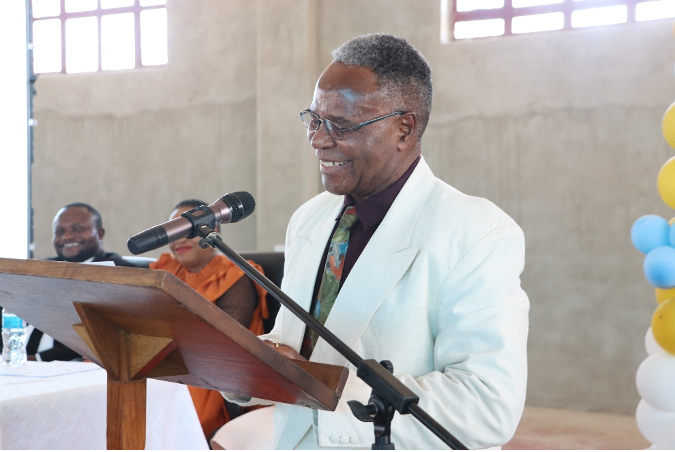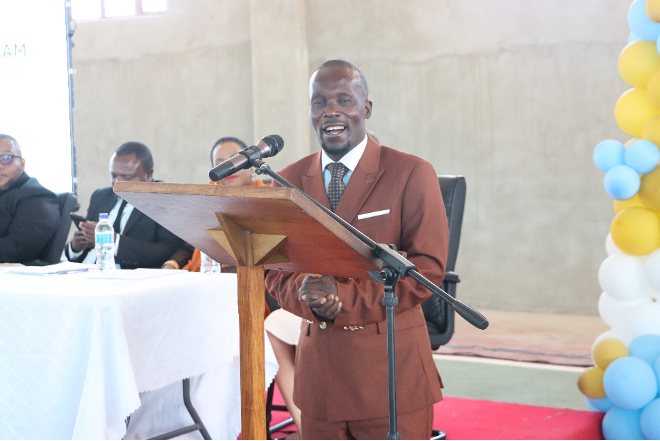Empowering Futures: 186 Youths Graduate from USAID Digital Skills Training

By Leana Padera (Communications Intern)
In a vibrant celebration of hope and opportunity, 186 young people from Caledonia and Epworth proudly received their certificates after six months of intensive digital skills training, opening doors to brighter futures and economic empowerment. The graduation ceremony, held at the Catholic University of Zimbabwe, marked a significant milestone for the participants of the USAID-funded Digital Skills Training Program, supported by World Vision Zimbabwe, the World Food Programme, and the Government of Zimbabwe.
The event was graced by the Deputy Minister of Youth Empowerment and Vocational Training, Mr. Kudakwashe Mupamhanga, alongside the Vice Chancellor of the Catholic University of Zimbabwe, Dr. Zinyemba. Their presence highlighted the importance of collaborative efforts in equipping the nation’s youth with the skills needed to thrive in an increasingly digital world.
"This program is a key part of empowering young people to become productive members of their communities," said Mr. Mupamhanga. "Our Vision 2030 includes young people, and we are pleased with the work our partners are doing to enable them to contribute to the nation's development."
The program provided the graduates with vital digital competencies, including graphic design, website development, and data analysis. These skills not only equip them to enter the modern job market but also enable them to create entrepreneurial opportunities within their communities. Already, many of the graduates have started small businesses or taken on freelance gigs to support their families.
Archward Mamhunze, one of the graduates, shared his personal journey during the ceremony. "I never imagined I could achieve this. When I go back to my community, I want to inspire my peers with this certificate. I want them to know that they can do it too," he said, smiling proudly.
For Mamhunze and many others, the training was more than just acquiring new skills—it was a lifeline that opened up possibilities for a better future. His story is echoed by many of his fellow graduates, several of whom have already registered their own businesses or secured employment in various industries.

Dr. Zinyemba, Vice Chancellor of the Catholic University of Zimbabwe, commended the graduates and urged them to stay focused and present in their work. "I would like to encourage the young people in this room to remain focused, and wherever you are, be there," he said with a smile. His message emphasized the importance of mindfulness and dedication in achieving long-term success.
Speaking during the ceremony, Fioma Garba, World Food Program Head of External Relations, highlighted the purpose behind the initiative: "This powerful vision was created to empower youths from vulnerable communities by breaking down barriers that keep them from fully participating in the digital age."
The Deputy Minister also praised the collaboration between the government, USAID, and implementing partners like World Vision Zimbabwe. "The success of this program demonstrates what can be achieved when we work together to address youth unemployment and skill gaps in our country."
World Vision Zimbabwe’s field officer, Nyasha Mujakachi, expressed gratitude to the partners who made the program possible. "This project has changed the lives of these young people and their families. We are incredibly thankful for the support we have received from USAID and the World Food Programme," he said.

The program's impact extends beyond the graduates themselves. Proud parents like Mr. Gwarada have witnessed firsthand the transformative effects of the training. His daughter, Meryline, has applied her newfound skills in graphic design to help grow his poultry business. "She has been designing flyers and posters, and I’ve seen a significant increase in customers since she started helping out," Gwarada shared with pride.
These stories of change demonstrate the broader ripple effects that skills development programs can have on communities. By empowering young people with practical, marketable skills, the program is fostering not only individual success but also broader economic growth within their families and neighbourhoods.
While the ceremony marked the end of formal training for the graduates, it also signalled the beginning of a new chapter—one filled with opportunities for self-sufficiency and growth. With the support of the government and organizations like World Vision Zimbabwe, these young graduates are now equipped to navigate the challenges of the modern workforce.
"Our Vision 2030 includes young people, and we are pleased with the work our partners are doing to empower them to become productive members of their communities," said Mr. Mupamhanga, reflecting on the significance of the program.
As these 186 graduates step into their futures with newfound skills and confidence, the program stands as a testament to the power of collaboration in shaping the next generation of leaders and entrepreneurs in Zimbabwe. With continued support and investment, initiatives like this digital skills program are laying the foundation for a brighter, more sustainable future.